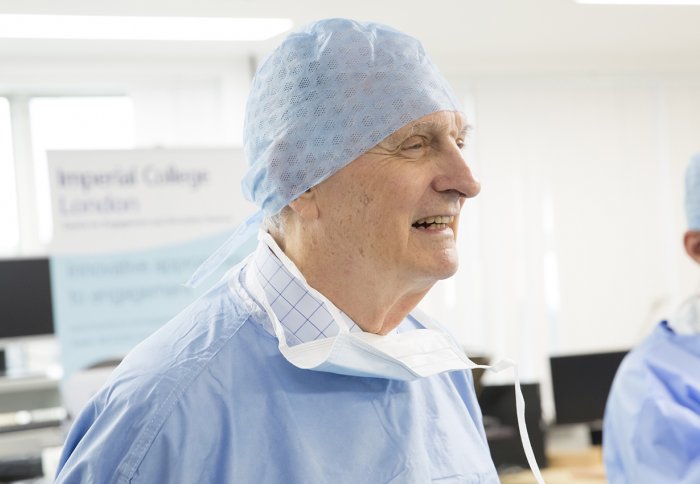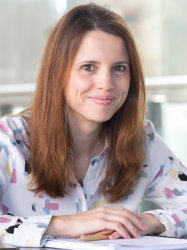

Alan Alda - the renowned actor, writer, director, and presenter - visited Imperial this week, meeting researchers and trying simulated surgery.

Alan Alda and Prof. Alice Gast
Mr Alda is an enthusiastic supporter of science who has presented long-running science programmes on PBS and helped to found the Alan Alda Center for Communicating Science at Stony Brook University.
He met several Imperial researchers during his visit, which was hosted by Imperial’s President, Professor Alice Gast. Mr Alda was accompanied by his wife, the author and photographer Arlene Alda.
Mr Alda, who starred in the TV show M*A*S*H as wartime surgeon Hawkeye Pierce, donned surgical scrubs again to take part in a simulated operation at the Imperial College Centre for Engagement and Simulation Science. He joined a team of real-life surgical professionals for the operation, helping to operate on a dummy patient with fake organs that spurted out fake blood.

Alan Alda (left) tries simulated surgery
Professor Roger Kneebone, Director of the centre, explained how it uses realistic simulations of operations and other clinical procedures to enable medical staff to practice their skills, and test how easily new technologies can be integrated into medicine.
“It was funny because I did 11 years of simulating surgery but it was different because we never used fake guts,” said Mr Alda. “I always operated on a piece of foam rubber. Sometimes, because I had to use a lot of doctor talk that I couldn’t remember, I would operate on a script!
“I’ve seen a lot of operations for the science show that I did,” he added. “This is very much like that. The only thing I heard that was missing were the jokes!"
As part of his tour of the centre, Mr Alda also performed a simulated rectal examination on a robotic rectum, guided by one of its creators, Dr Fernando Bello. This technology helps train doctors and nurses to perform rectal examinations by accurately recreating the feel of a rectum, as well as providing feedback on their examination technique.

Alan Alda performs a robotic rectal exam, guided by Dr Fernando Bello
Monday's visit also took Mr Alda and his wife to the Royal College of Music, where they saw a different use of simluation. Professor Kneebone has been working with researchers at the Royal College who have created a realistic experience of performing in front of a 'live' audience, using virtual reality. The performance simulator is used by Royal College musicians to practise for auditions and concerts, as well as students at Imperial College Business School who want to practise public speaking. Researchers are also using the performance simulator to analyse the physical effects of performance.

Alan Alda in front of a virtual audition panel
Earlier in the day, Mr Alda and his wife toured Imperial’s Centre for Bio-Inspired Technology, which is led by Professor Chris Toumazou, a Regius Professor of Engineering. Researchers at the centre are developing a range of small electronic devices, inspired by human biology, which are helping to diagnose and treat disease. Professor Toumazou talked with the visitors about a new HIV test on a USB stick, which uses a drop of blood to analyse the amount of HIV virus in the bloodstream and could be used by patients to monitor their own treatment. He and his colleagues from the centre also discussed how they are developing an artificial pancreas, to monitor and treat diabetes. In addition, they showed the visitors handheld technology that can carry out quick genetic tests to analyse whether people are predisposed to a range of conditions, and also monitor the effectiveness of treatments such as chemotherapy.

Prof Chris Toumazou invited Alan Alda into Imperial's anechoic chamber
Professor Toumazou invited Mr Alda to step into Imperial’s anechoic chamber, which is designed to completely absorb sound and electromagnetic waves and is used for some of the testing of the technology under development.
At the end of his tour of Imperial, Mr Alda praised the way in which people at Imperial are working together across different disciplines. “It was delightful to see the attention paid to bringing a team together - bringing people together who wouldn’t normally communicate because they’re in the silos of their own speciality,” he said. “Collaboration is going to give us breakthroughs we can’t even imagine at the moment, but to do that we need to bring together specialities and they don’t go together very easily.”
Asked why he is such a passionate advocate of scientists communicating about their work, he said: “I’m tremendously interested in communicating because the public need to understand science so they can champion and improve and spend on science - and also so they can raise informed questions about it, because feedback from the public is very important, but only if they are exposed to real knowledge and not rumour and fear.”
Article text (excluding photos or graphics) available under an Attribution-NonCommercial-ShareAlike Creative Commons license.
Photos and graphics subject to third party copyright used with permission or © Imperial College London.
Reporter

Laura Gallagher
Communications Division

Contact details
Tel: +44 (0)20 7594 6701
Email: l.gallagher@imperial.ac.uk
Show all stories by this author




Leave a comment
Your comment may be published, displaying your name as you provide it, unless you request otherwise. Your contact details will never be published.